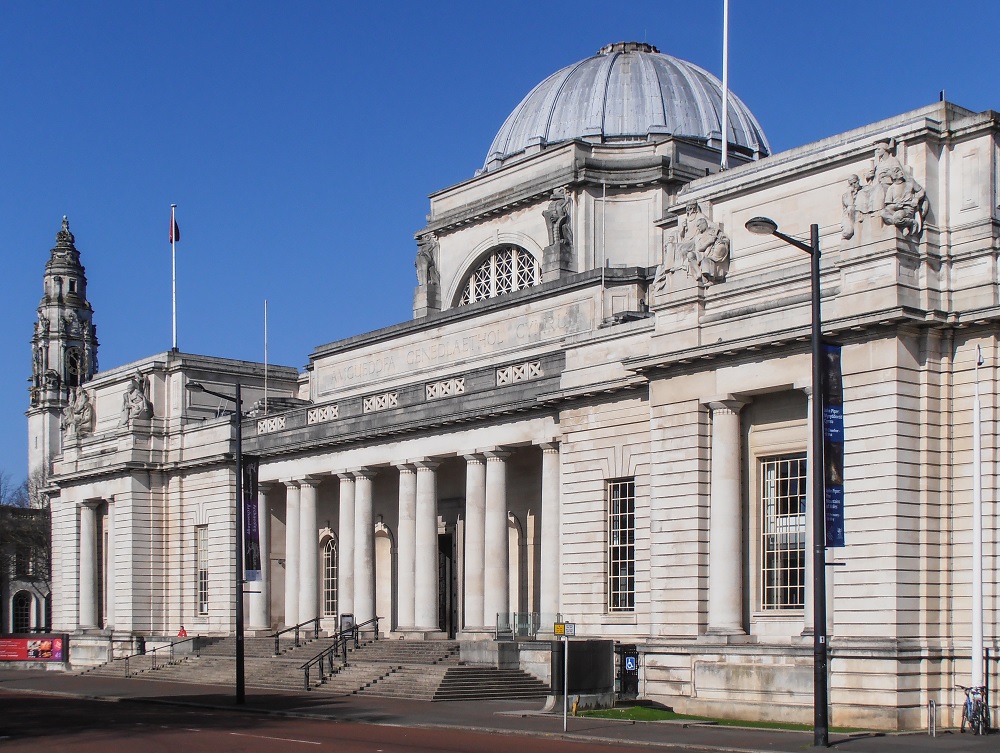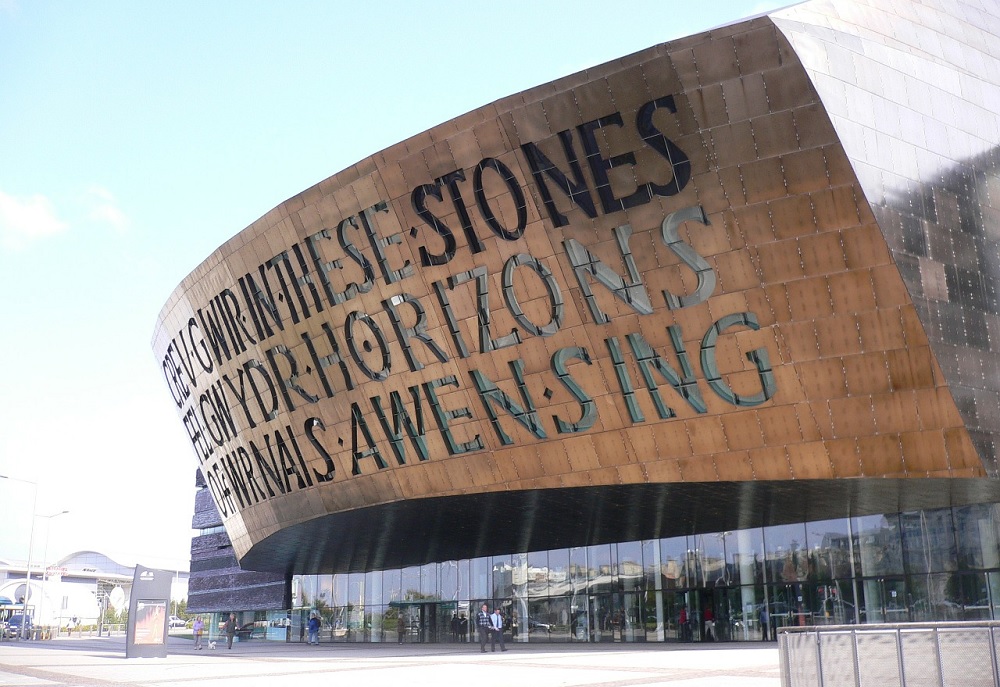No, Welsh language requirements do not exclude people of colour

Adam Pearce
It seems unlikely that the authors of a recent report jointly commissioned by the Welsh Arts Council and the National Museum of Wales into their treatment of people of colour realised that it would make headlines in the Daily Mail, Express or Telegraph.
I do not know enough personally about the inner workings of either organisation to comment on the broad thrust of the report – except to say that it would be no surprise whatsoever to learn that there are shortcomings in both – and I see no reason to doubt their overall conclusions. People of colour, as well as their stories, are poorly represented by our arts and heritage sectors for a variety of social and historical reasons which it is absolutely right and crucial that we address.
However, I take issue with the claim (more implicit than explicit in the report itself, it must be said) that Welsh language requirements, especially on job vacancies, exclude people of colour. This claim is not only false, it is also extremely dangerous and pernicious, and needs to be decisively refuted.
This claim – for which the report itself offers no evidence – appears to be based on the assumption that few or no people of colour speak Welsh. This misconception is not just outright wrong historically (as brilliantly explored by Simon Brooks in his recent book Hanes Cymry) but is itself offensive, treating Welsh speakers of colour as if they do not exist – something which has understandably led to many frustrated comments on social media by Welsh speakers of colour. It would be interesting to know whether the authors of the report spoke to any of this group as a part of their research.
The reality is that, of course, there are Welsh speakers of colour – thousands of them. This will not be a surprise to anyone who’s ever watched S4C or seen the intake of a typical Welsh medium school, however, it’s reflected in the official statistics too: according to the 2011 census, 2% of Welsh speakers recorded an ethnicity other than white (over ten thousand individuals). To put this another way, approximately 25% of Welsh-born people of colour – a comparable figure to the overall average of people born in Wales that can speak welsh.
Of course, a much smaller percentage of those born outside Wales can speak Welsh, and as this group makes up a much bigger proportion of non-white communities, a smaller proportion of Welsh speakers are people of colour (2%) than the proportion in the general population (4.4%).
This should be no surprise, given that there are vanishingly few opportunitities to learn Welsh outside Wales, compared to English. Nonetheless, it bears repeating: a person of colour born in Wales is about as likely to speak Welsh as a white person born in Wales.
Conflict
One can only hope that both organisations will choose to disregard this unfortunate aspect of the reports, which I’m certain will have otherwise identified genuine problems with representation and inclusion in both orgaisations.
Whatever happens, however, in some respects the damage is already done: this report has now set an uncomfortable precedent in needlessly placing the cause of the Welsh at odds with broader notions of Equality and Diversity. Anyone naive enough to think otherwise need only look at the way the right-wing press – those famous champions of cultural and social inclusion – gleefully (and, one suspects, deliberately) misreported the story: “Welsh language is racist and ‘excludes minorities’“ ran the Daily Mail; “Welsh language use ‘systemically racist’, Arts Council warned” ran the Telegraph.
It shouldn’t need pointing out that neither publication cares about minorities: they are simply licking their lips at the sight of two of the things they hate most – the Welsh language and social justice – being pitted against each other. The report in fact claimed neither of these things about the Welsh language itself, but by bringing it into the debate it was simply inevitable that it would be framed in this way.
Sadly, this argument is likely to be a self-reinforcing one, and is a new version of an idea that has long been peddled in Wales: that Welsh is inherently insular, closed-minded – and the unstated corollary that English is the outward-looking language of progress (for a detailed deconstruction of this idea we are indebted once again to Simon Brooks, and his book Pam Na Fu Cymru).
There is an echo here of another much older report, that of the Commissioners of Enquiry into the State of Education in Wales back in 1847, better known of course as the Blue Books. That infamous document invented a conflict between Welsh and education, this new report creates one between Welsh and social justice.

Interact
In reality, the commonalities of experience between Welsh speakers and other minorities everywhere should make us all allies in the shared goal of a diverse, inclusive society where everyone is free to live their lives within their own identities, rather than under the hegemony of a majority – whether that is language or race.
There is no conflict between Welsh and social justice other than that which is imagined by those who fail to see that language rights and language equality are just other strands of the equality we are all striving for.
Welsh is our national language and it is only right and proper to expect that it is at the forefront of the provision of our national institutions. As a Welsh speaker, one of my favourite things about visiting our national museum sites is the knowledge that even in the south, you can count on the staff being able to speak Welsh. Except for schools or occasional events like the Eisteddfod, it is one of the few spaces outside y Fro Gymraeg where this is the case.
Thus, as well as being a vital space for all Welsh speakers, rather than excluding minorities, our museums and art sectors are some of the most important places where the Welsh language is able to engage and interact with those exact same people of colour that, we are told, it is excluding.
To see that dismantled in the name of inclusion would be a misfortune whose tragedy would be exceeded only by its irony.
Support our Nation today
For the price of a cup of coffee a month you can help us create an independent, not-for-profit, national news service for the people of Wales, by the people of Wales.







Don’t feed the troll.
It started with a half-reasonable point that “I don’t feel White”, because after all, the only people who see White as a cohesive group as such, are White supremacists, but then it gets silly and is clearly bad-faith argument.
One of the other commentators suspects you’re trolling, but perhaps you’re using surrealism to encourage lateral thinking. So, here are my lateral thoughts: You’re under no obligation to identify as anything at all! Just be. Admittedly, just being will not solve the problem of discrimination, because other people will insist on identifying you as something, but it’s still very liberating. It’s not as ridiculous as it sounds. Identifying yourself according to your hair texture or the melanin density in your skin is just as arbitrary as identifying yourself by your MHC haplotype or your blood-group or your hat size. You’ve… Read more »
Go to page 47, answer the questions and I would defy anyone, white or black, NOT to feel discriminated against. They managed to find 63 “artists and artworkers of black and non-black people of colour” to ask to take part and two thirds didn’t bother to answer even though they were offered £200 an hour. As for the agenda I suspect it is the £50,000 they got out of ACW and nothing more. I did rather like the complaint that on a school visit the museum attendants failed to tell a schoolgirl how to become an artist so that proves… Read more »
1/ Has ACW and the museum met the public security to award such a large bid to people without any public names attached? 1.1./ How many Welsh language speakers wrote this report? 1.1./ How many Welsh language speakers were interviewed for this report? 1.2/ Why did ACW fund something that refused to engage with quantitative research? 1.3/ Why was this report not proofread? 1.4/ Why is this report only in Welsh? Does this tell us about the bias of WAARU, ACW and the museum, or all of them? 1.5/ What % of their work can be publically accessible? 2/ Is… Read more »
Why did Amgueddfa Cymru and the Arts Council accept an anonymous report? (Because the WAARU report was unsigned.) In the report’s PDF metadata:— Author: Diane Hebb ModDate: Thu Aug 5 10:49:01 2021 UTC According to this web page, Diane Hebb is the Director of Arts Engagement at Arts Council of Wales. The role involves developing, managing and implementing strategies and programmes that lead to more people creating, enjoying and taking part in the arts in Wales.On completing her dance degree, Diane moved to Wales to join a dance in education company and then took up the post of Dance Animateur and… Read more »
Thanks for digging that out. It’s a familiar litany from the CVs of millions of paper-shuffling, conviction-lacking career-chasers whose only motivation is their next potential promotion.
Why does she not mention having learned Welsh after moving to Wales?
If this is correct, then this woman’s position the Arts Council is untenable. She should be dismissed immediately.
It’s scandalous if she’s the author, but I suppose it could be a computer artefact — if an external entity provided the Arts Council with a MS-Word document which then got turned in to a PDF on an Arts Council computer.
But you’re right either way: she works in HR, where such glaring incompetence at basic data security is unforgivable whether shady or not. Her access to employees’ & job-applicants’ personal data needs to be revoked immediately.
There are just more questions.
Surely the two organisation would have asked for the submissions in PDF? And documents can quite easily be converted from MS Word to PDF. So why couldn’t the writer of the document have done that?
And if she did convert the submission from MS Word to PDF that’s no reason to withhold the name of the writer.
You’re right. But did she just type it up? And if so, did she do that to hide the identity of the author?
If she really was the author, then was it done with the knowledge of the Arts Council?
We need answers.
P.S. It even comes up on Google.
I love the idea that Trans-Black-African could become a socially desirable thing, especially given the horrible name the idea bore in the nineties. How society revolves.
Did she pocket a fee from her own employer ? Nice work ! Mafia still thriving in Kairdiff, Crachach better look out when these corrupt folk muscle in on the pots of cash
It’s only just come to me that if trans-black-African is legitimised, then in response to the ethnic background question you could simply write TBA…